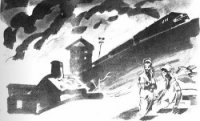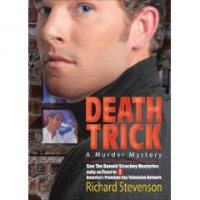Watership Down - Adams Richard George (книги полностью бесплатно .txt) 📗
"Not asleep, Silver?" he said.
"It's too dangerous, Hazel," replied Silver. "I'd like to sleep as much as anyone, but if we all sleep and something comes, who's going to spot it?"
"I know. I've found a place where we can sleep safely for as long as we like."
"A burrow?"
"No, not a burrow. A great field of scented plants that will cover us, sight and smell, until we're rested. Come out here and smell it, if you like."
Both rabbits did so. "You say you've seen these plants?" said Bigwig, turning his ears to catch the distant rustling of the beans."
"Yes, they're only just over the top. Come on, let's get the others moving before a man comes with a hrududu [5] or they'll scatter all over the place."
Silver roused the others and began to coax them into the field. They stumbled out drowsily, responding with reluctance to his repeated assurance that it was "only a little way."
They became widely separated as they straggled up the slope. Silver and Bigwig led the way, with Hazel and Buckthorn a short distance behind. The rest idled along, hopping a few yards and then pausing to nibble or to pass droppings on the warm, sunny grass. Silver was almost at the crest when suddenly, from halfway up, there came a high screaming-the sound a rabbit makes, not to call for help or to frighten an enemy, but simply out of terror. Fiver and Pipkin, limping behind the others, and conspicuously undersized and tired, were being attacked by the crow. It had flown low along the ground. Then, pouncing, it had aimed a blow of its great bill at Fiver, who just managed to dodge in time. Now it was leaping and hopping among the grass tussocks, striking at the two rabbits with terrible darts of its head. Crows aim at the eyes and Pipkin, sensing this, had buried his head in a clump of rank grass and was trying to burrow further in. It was he who was screaming.
Hazel covered the distance down the slope in a few seconds. He had no idea what he was going to do, and if the crow had ignored him he would probably have been at a loss. But by dashing up he distracted its attention and it turned on him. He swerved past it, stopped and, looking back, saw Bigwig come racing in from the opposite side. The crow turned again, struck at Bigwig and missed. Hazel heard its beak hit a pebble in the grass with a sound like a snail shell when a thrush beats it on a stone. As Silver followed Bigwig, it recovered itself and faced him squarely. Silver stopped short in fear and the crow seemed to dance before him, its great black wings flapping in a horrible commotion. It was just about to stab when Bigwig ran straight into it from behind and knocked it sideways, so that it staggered across the turf with a harsh, raucous cawing of rage.
"Keep at it!" cried Bigwig. "Come in behind it! They're cowards! They only attack helpless rabbits."
But already the crow was making off, flying low with slow, heavy wing beats. They watched it clear the further hedge and disappear into the wood beyond the river. In the silence there was a gentle, tearing sound as a grazing cow moved nearer.
Bigwig strolled over to Pipkin, muttering a ribald Owsla lampoon.
"Come on, Hlao-roo," he said. "You can get your head out now. Having quite a day, aren't we?"
He turned away and Pipkin tried to follow him. Hazel remembered that Fiver had said he thought he was injured. Now, as he watched him limping and staggering up the slope, it occurred to him that he might actually be wounded in some way. He kept trying to put his near-side front paw to the ground and then drawing it up again, hopping on three legs.
"I'll have a look at him as soon as they're settled under cover," he thought. "Poor little chap, he won't be able to get much further like that."
At the top of the slope Buckthorn was already leading the way into the beanfield. Hazel reached the hedge, crossed a narrow turf verge on the other side and found himself looking straight down a long, shadowy aisle between two rows of beans. The earth was soft and crumbling, with a scattering of the weeds that are found in cultivated fields-fumitory, charlock, pimpernel and mayweed, all growing in the green gloom under the bean leaves. As the plants moved in the breeze, the sunlight dappled and speckled back and forth over the brown soil, the white pebbles and weeds. Yet in this ubiquitous restlessness there was nothing alarming, for the whole forest took part in it and the only sound was the soft, steady movement of the leaves. Far along the bean row Hazel glimpsed Buckthorn's back and followed him into the depths of the field.
Soon after, all the rabbits had come together in a kind of hollow. Far around, on all sides, stood the orderly rows of beans, securing them against hostile approach, roofing them over and covering their scent. They could hardly have been safer underground. Even a little food could be had at a pinch, for here and there were a few pale twists of grass and here and there a dandelion.
"We can sleep here all day," said Hazel. "But I suppose one of us ought to stay awake; and if I take the first turn it'll give me a chance to have a look at your paw, Hlao-roo. I think you've got something in it."
Pipkin, who was lying on his left side, breathing quickly and heavily, rolled over and stretched out his front paw, underside turned upward. Hazel peered closely into the thick, coarse hair (a rabbit's foot has no pads) and after a few moments saw what he had expected-the oval shank of a snapped-off thorn sticking out through the skin. There was a little blood and the flesh was torn.
"You've got a big thorn in there, Hlao," he said. "No wonder you couldn't run. We'll have to get it out."
Getting the thorn out was not easy, for the foot had become so tender that Pipkin winced and pulled away even from Hazel's tongue. But after a good deal of patient effort Hazel succeeded in working out enough of the stump to get a grip with his teeth. The thorn came out smoothly and the wound bled. The spine was so long and thick that Hawkbit, who happened to be close by, woke Speedwell to have a look at it.
"Frith above, Pipkin!" said Speedwell, sniffing at the thorn where it lay on a pebble. "You'd better collect a few more like that: then you can make a notice board and frighten Fiver. You might have poked the lendri's eye out for us, if you'd only known."
"Lick the place, Hlao," said Hazel. "Lick it until it feels better and then go to sleep."
10. The Road and the Common
Timorous answered, that they… had got up that difficult place: but, said he, the further we go, the more danger we meet with; wherefore we turned, and are going back again.
After some time, Hazel woke Buckhorn. Then he scratched a shallow nest in the earth and slept. One watch succeeded another through the day, though how the rabbits judged the passing of the time is something that civilized human beings have lost the power to feel. Creatures that have neither clocks nor books are alive to all manner of knowledge about time and the weather; and about direction, too, as we know from their extraordinary migratory and homing journeys. The changes in the warmth and dampness of the soil, the falling of the sunlight patches, the altering movement of the beans in the light wind, the direction and strength of the air currents along the ground-all these were perceived by the rabbit awake.
The sun was beginning to set when Hazel woke to see Acorn listening and sniffing in the silence, between two white-skinned flints. The light was thicker, the breeze had dropped and the beans were still. Pipkin was stretched out a little way away. A yellow-and-black burying beetle, crawling across the white fur of his belly, stopped, waved its short, curved antennae and then moved on again. Hazel grew tense with sudden misgiving. He knew that these beetles come to dead bodies, on which they feed and lay their eggs. They will dig away the earth from under the bodies of small creatures, such as shrew mice and fallen fledglings, and then lay their eggs on them before covering them with soil. Surely Pipkin could not have died in his sleep? Hazel sat up quickly. Acorn started and turned toward him and the beetle scurried away over the pebbles as Pipkin moved and woke.
5
Tractor-or any motor.
6
Hoi, hoi, the stinking Thousand, We meet them even when we stop to pass our droppings."




